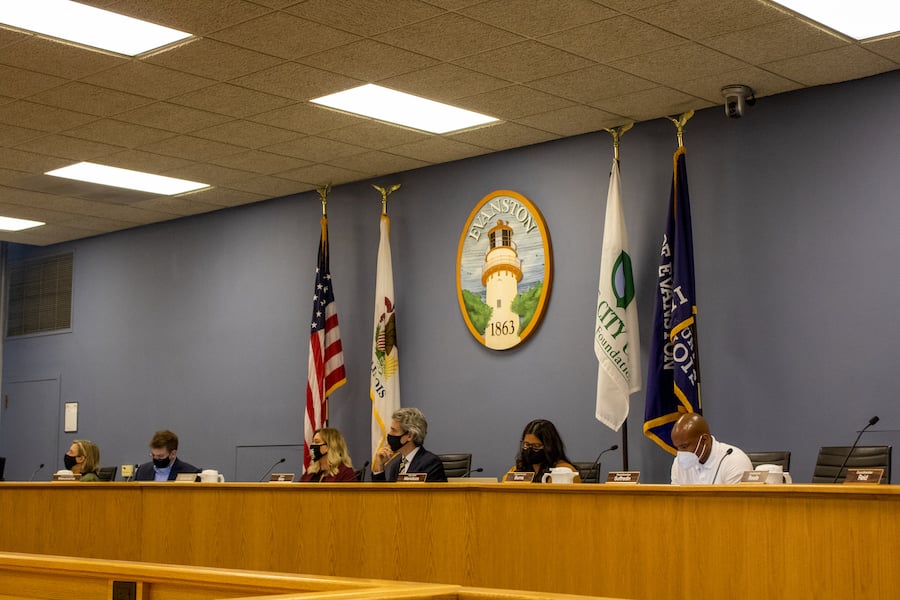Sustainability coordinator shares CARP progress, shortcomings at City Council meeting
Daily file Photo by Madison Smith
At Monday’s meeting, councilmembers highlighted that the city needs more investment in long-term sustainability infrastructure to advance the Climate Action and Resilience Plan.
October 25, 2022
Evanston’s Sustainability and Resilience Coordinator Cara Pratt presented an update on the Climate Action and Resilience Plan at Monday’s City Council meeting.
Pratt cited the city’s 38% decrease in carbon emissions since 2005 as a sign of CARP’s success, but expressed that the city needs to allocate more resources toward sustainability efforts.
Pratt said the city has to prioritize inexpensive and easy projects that help the city inch toward its sustainability goals. She pointed to the city’s steady increase in registered electric vehicles as an example of being a “catalyst” for change, rather than a “barrier.”
“If we don’t continue to innovate and offer opportunities for (electric vehicle) charging to residents, especially to those without access to a garage, the city may be a barrier to the change residents are seeking,” Pratt said.
CARP was approved by City Council in late 2018 and aims to decrease carbon emissions by 50% by 2025 and 100% by 2050. The city has promised to expedite CARP’s progress after passing a resolution declaring a climate emergency in Evanston in April.
Ald. Eleanor Revelle (7th) said Evanston needs to invest in long-term renewable energy infrastructure rather than relying on renewable energy certificates. RECs state the city generated one megawatt-hour of electricity from clean sources, which allows Evanston to purchase clean energy.
According to Pratt’s presentation, without RECs, emissions would have increased by 2% from 2020 to 2021 instead of decreasing.
Councilmembers also discussed ways the new 2023 proposed budget could further CARP’s goals. The Sustainability Fund, created in 2022 to advance the program, is projected to increase from $118,000 to $717,000 in this year’s budget.
The city also plans to add a community outreach specialist and a resilient buildings specialist to assist Pratt with implementing CARP policies.
While Mayor Daniel Biss said he supports adding the two members to the sustainability staff, he emphasized that prioritizing climate infrastructure will require the city to cut funding in other areas.
“If we care about this work to the extent that we say we do, I think we have to be prepared to demonstrate that in the trade-offs that we make, for instance, in our budget,” Biss said. “I don’t think we’re in a position to say yes to everything — probably never, and certainly not this year.”
Biss said he does not support the proposed $402.5 million city budget at a special council meeting last week, emphasizing that the city needs to find more efficiency in the budget.
Ald. Devon Reid (8th) asked how the city plans to fund these two new positions. Pratt said the money would come from money the city used to purchase RECs, as well as revenue from the city’s wheel tax.
The council approved a $5 wheel tax for all registered vehicles in Evanston in May. Reid said the city should increase the wheel tax to generate more funding for CARP.
“This body here has to take tough votes to require that people change behavior because in some cases, that is the only way that people will actually change their behavior,” Reid said.
Pratt said CARP’s top priorities for 2023 include implementing the new bag tax, installing solar energy at municipal buildings and using electric- and battery-powered hand tools instead of gas-powered tools.
Ald. Jonathan Nieuwsma (4th) said CARP’s long-term goals require efforts from all around Evanston – not just City Council and city staff.
“We are not going to get where we need to be in the community if all the institutions in town and all of the individuals and all the residents in town aren’t on board and moving in the same direction,” Nieuwsma said.
Email: [email protected]
Twitter: @saullpink
Related Stories:
— CARP struggles to gain traction three years after its implementation
— Evanston residents and councilmembers discuss 2023 Capital Improvement Plan












